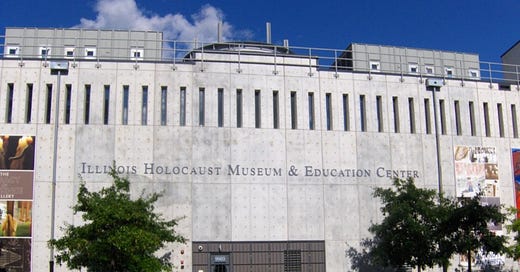Yes, Millennials, the Holocaust actually happened
Almost 6 million Jews were killed in the Holocaust, but we’re taking selfies
I took multiple selfies in front of the Illinois Holocaust Museum & Education Center. I made sure my hair was just right and my summer dress would flow in the wind, and I took gorgeous photos in front of what I viewed as a beautiful background, the Ferro Fountain of the Righteous. I saw nothing wrong with the idea. In retrospect, I wish Israeli artist Shahak Shapira caught wind of my selfies and blasted me the way he did these tourists. I should have known better in the first place, but I simply did not equate what I was doing as wrong.
ADVERTISEMENT ~ Recommended Read from Amazon
As an Amazon Affiliate, I earn a percentage for each purchase with my referral links.

However, I’m still somewhere between disappointed and annoyed to find out recent news from the Claims Conference (via Guardian): 63% of adult Americans (between the ages of 18 and 39) did not know that 6 million Jewish people were killed during the Holocaust. Initially I was hoping that the confusion was knowing the exact number, not that the Holocaust happened at all. But more than one in 10 believed Jewish people caused the Holocaust.
Approximately 48% could not name any concentration camps or ghettos, and 23% said they believed the Holocaust was a myth altogether. (Data was collected from 1,000 nationwide interviews, 200 per state.) While reading these numbers, I was puzzled about why I knew so little and so much about the Holocaust during my teenage years. As much as I brag about my black history and literature education during my elementary school years, and then almost getting expelled in undergrad before transferring from a PWI to an HBCU, Jewish history was not something taught to me.
Recommended Read: “From PWI to HBCU: Why I fled ~ College, and threat of expulsion, made my naivete about racism disappear”
ADVERTISEMENT ~ Amazon
As an Amazon affiliate, I earn a percentage from purchases with my referral links. I know some consumers are choosing to boycott Amazon for its DEI removal. However, after thinking about this thoroughly, I choose to continue promoting intriguing products from small businesses, women-owned businesses and (specifically) Black-owned businesses who still feature their items on Amazon. All five of my Substack publications now include a MINIMUM of one product sold by a Black-owned business. (I have visited the seller’s official site, not just the Amazon Black-owned logo, to verify this.) If you still choose to boycott, I 100% respect that decision.

For the life of me, I have no idea why I had a vague understanding of how many were killed or the basics of the Holocaust. I definitely would’ve fallen into the group who couldn’t name a concentration camp. But what finally set me in motion of learning more about the history of this tragedy was a writing project. I was hired to read and dissect a then-new book, “The Auschwitz Escape” by Joel C. Rosenberg, breaking it down by each chapter for a client’s academic project. Reading a book for pleasure is one thing; reading it with the intention of creating high-school and college-level academic work is another.





